The business activity in the world has grown from domestic trade to international trade, which is known as globalisation, over the years from the inception of trade. The government in the world has started collecting taxes/ duties on the goods imported into or exported from the country. The main reasons for imposing taxes/duties are 1) to protect the domestic industries from foreign competitors; 2) to increase the revenue; and 3) to control the flow of certain products.
However, in order to spur the economy, many countries in the world have signed Free Trade Agreement (FTA) either between two countries (Bilateral FTA) or several countries (Multilateral FTA). The FTA will outline certain obligations with respect to trade in goods and services and provide protection for investors and intellectual property rights between the treaty countries. Among the obligations is the reduction or elimination of tariffs on goods and services being imported. In Malaysia, there are seven Bilateral FTAs and seven Multilateral (Regional) FTAs being signed and in force, and two signed FTAs but pending ratification and entry into force as follows1:
Bilateral FTA
1. Malaysia-Japan Economic Partnership Agreement (MJEPA)
2. Malaysia-Pakistan Closer Economic Partnership Agreement (MPCEPA)
3. Malaysia-New Zealand Free Trade Agreement (MNZFTA)
4. Malaysia-India Comprehensive Economic Cooperation Agreement (MICECA)
5. Malaysia-Chile Free Trade Agreement (MCFTA)
6. Malaysia-Australia Free Trade Agreement (MAFTA)
7. Malaysia-Turkey Free Trade Agreement (MTFTA)
Multilateral (Regional) FTA
1. ASEAN Free Trade Area (AFTA)
2. ASEAN-China Free Trade Agreement (ACFTA)
3. ASEAN-Korea Free Trade Agreement (AKFTA)
4. ASEAN-Japan Comprehensive Economic Partnership (AJCEP)
5. ASEAN-Australia-New Zealand Free Trade Agreement (AANZFTA)
6. ASEAN-India Free Trade Agreement (AIFTA)
7. ASEAN-Hong Kong Free Trade Agreement (AHKFTA)
FTAs signed but Pending Ratification and Entry into Force
1. Regional Comprehensive Economic Partnership (RCEP)
2. Comprehensive and Progressive Agreement for Trans-Pacific Partnership (CPTPP)
In order to enjoy the preferential rate of tariff, the goods must be included in the tariff reduction and elimination schedule and satisfy the Rule of Origin (ROO). To be eligible for tariff concessions, ROO determines the country of origin of a product. ROO for a product may vary across the different FTAs.
On the other hand, under the Generalised System of Preferences (GSP), developed countries grant preferential treatment to eligible products imported from developing countries, so that the export products of developing countries would be competitive in the markets of developed countries. The preferential treatment comes in the form of lower import duty, and it is granted without any reciprocal obligations on the part of developing countries.
Similar to FTA, ROO shall apply to the goods being imported from the developing countries by the developed countries in order to enjoy preferential treatment under GSP.
To comply with the ROO, a competent authority of the exporting country that certifies the origin of the goods will issue a Certificate of Origin (CO). There are two types of CO which are Preferential Certificate of Origin (PCO) and Non-Preferential Certificate of Origin (NPCO). PCO is a certificate issued by a competent authority of the exporting country that certifies the origin of the goods, which allows importers to claim for preferential tariff rates based on the ROO of each agreement in force. Whereas NPCO is a certificate that helps in identifying the origin of the goods and it is not used to claim for preferential tariff rates. Even though NPCO does not qualify for the benefits of tariffs concession, NPCO is still widely used and can be used as a tool to gauge the quality and prestige of the exported products.
In Malaysia context, PCO can be applied by the exporters through the Ministry of International Trade and Industries (MITI). Exporters are required to fulfil the rules and conditions set by MITI. For the full guideline of the process of applying for a PCO, please click here. For NPCO, exporters can apply through the Chambers of Commerce and Associations authorized by MITI. For the full list of the Chambers of Commerce and Associations, please click here.
To gain a competitive advantage in the domestic market and reduce the cost of doing business, importers will endeavour to source their supplies/goods from a country whereby they can enjoy the preferential tariffs upon the importation of goods. Therefore, exporters should apply for the CO of their goods/products which are eligible for preferential tariffs included in the relevant FTA in order to gain competitive advantage of their products/goods in international trade.
Ir. Dr. Justin LAI Woon Fatt
CEO/ Founder
IPM Group
References
1. Sources from MITI website as at 27-11-2020. Please click here for latest list.
